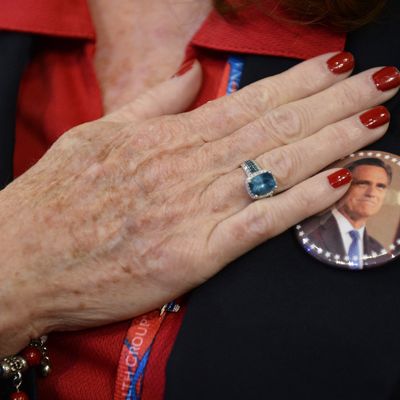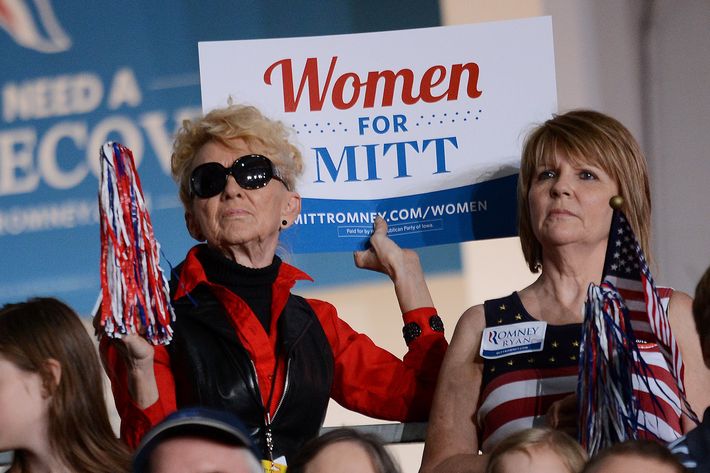
A little more than a year ago, Katie Packer Gage was watching the Virginia governor’s race and feeling déjà vu. Terry McAuliffe and his Democratic allies were burying Republican Ken Cuccinelli under a multi-million-dollar avalanche of ads highlighting his record on reproductive rights. Conveniently for Democrats, Cuccinelli had built his political career on the very policies Democrats argued amounted to a war on women — opposing abortion in cases of rape or incest, trying to shut down clinics, supporting measures that could ban contraception — and they used it against him, locking in the nine-point gender gap that gave McAuliffe his victory. While the candidates were different, the strategy looked familiar: This was how Democrats beat her boss back in 2012.
Packer Gage was Mitt Romney’s deputy campaign manager. After he lost, she and Ashley O’Connor, his ad director, thought a lot about why the campaign had been unable to effectively respond to the attacks portraying Romney as anti-women. “He wasn’t this old caveman,” she says. “There were lots of good things he was saying, but women weren’t hearing it because Democrats were basically lying about him more effectively than we were telling the truth.”
A week after Cuccinelli’s loss, Packer Gage and O’Connor announced the creation of Burning Glass Consulting, a Republican firm run by women with the aim of helping their candidates win over more women voters. Women, specifically unmarried women, were key to Democratic wins in three of the previous four election cycles. Obama won women by 12 points in 2012, 2 points less than he won them by in 2008, by winning unmarried women by 36 points. McAuliffe capitalized on that strategy, too, winning unmarried women by 42 points.
Democrats have focused their core messaging on women so intensely that the fight for women voters has become one of the most important in American politics. The midterm elections were the first time the GOP fully joined the fight, with Packer Gage and her colleagues leading the effort. “Campaigns largely over the last 50 years have been run by men, to elect men, by communicating to men. It ignores the fact that 53 percent of the electorate is women,” Packer Gage says. “We said, ‘What would we do differently on campaigns if we were talking only to women?’”
Packer Gage and O’Connor brought in a pollster, Christine Matthews, and started researching the best ways to advertise and speak to women voters. Among their goals: helping GOP candidates speak about abortion without stepping in it, encouraging the candidate and his team to respond directly to attacks, and teaching them how to turn the conversation to other areas of interest to women voters, like the economy and education.
Burning Glass doesn’t like to disclose the names of its clients, because they want candidates to seek their counsel without having to worry that they’ll be mocked for not understanding women. But in the seven races they worked on in 2014, six of their candidates won. And the kinds of improvements Packer Gage is talking about, both in message discipline and outreach to women voters, were evidenced across the party in the midterms this year.

O’Connor was one of the ad-makers for Larry Hogan, the long-shot GOP candidate for governor in deep-blue Maryland. Hogan was getting hit with war-on-women ads, and his team responded with an ad featuring his daughter. “These ads attacking him as anti-women are just wrong,” she says to the camera. “He’s the only candidate who favors over-the-counter birth control, covered by insurance. He’s committed to not changing current Maryland law on choice. Dad encouraged my sisters and me every step of the way. He loves this state, almost as much as he loves us.” In another ad, an African-American woman declares that she’s going to vote for a Republican for the first time ever. In the biggest upset of the night, Hogan won the election by five points.
Burning Glass was not a voice in the wilderness — they were very much part of the broader effort inside the Republican Party to do a better job talking to female voters. Two years after the party fielded Senate candidates like Todd “legitimate rape” Akin and Richard Mourdock, who pronounced that “even when life begins in that horrible situation of rape, that it is something God intended to happen,” there was no candidate this year who evinced the self-immolating instinct that hurt the entire party in previous cycles. It wasn’t a coincidence: The party was heavily involved in weeding out anyone they feared might say something Akin-esque. And even hopefuls the party did approve of were put to the test — for example, during a trip to Washington, a group of GOP candidates were ambushed at the airport by party staffers screaming questions about abortion and rape, preparing them for what lay ahead.
“I think one of the most important things we did as a party this cycle is we didn’t nominate any cavemen,” the type who say things like Akin and Mourdock, Packer Gage says. “It’s very hard to climb out from under that. One of the things we tried to do is anytime somebody said something boneheaded on our side of the aisle we’d pounce on that and say, ‘You don’t speak for Republicans; that’s not our position.’”
In Wisconsin, Scott Walker cut an ad trying to both soften his image and respond to attacks on his record of opposition to abortion. It’s not clear that Walker was a Burning Glass client, but his response showed that his team was thinking along similar lines. “Hi, I’m Scott Walker. I’m pro-life,” he says. “But there’s no doubt in my mind the decision of whether or not to end a pregnancy is an agonizing one.” In Colorado, Crossroads GPS ran an ad that featured a group of women standing around a kitchen table, complaining that they wanted to hear more about the economy from Mark Udall than his abortion-focused campaign had given them. Udall’s Republican opponent, Cory Gardner, and Hogan, like Thom Tillis in North Carolina, Ed Gillespie in Virginia, and Mike McFadden in Minnesota, campaigned on over-the-counter birth control in an attempt to neutralize Democratic attacks on Republican support for personhood, a legislative effort to define life as beginning at conception, which could outlaw abortion and some forms of birth control.
Democrats dismiss those efforts as cynical — the GOP’s plan for over-the-counter birth control, they point out, still needs to be approved by the FDA and would likely cost more for women who currently have it covered by their insurance — but they amount to a tacit acknowledgment from Republicans that it’s no longer acceptable to be quiet (or worse, ignorant) when it comes to reproductive rights. Now, with Republicans in charge on Capitol Hill and both parties in agreement that it’s on the GOP to demonstrate that they can govern, comes the added challenge of proving they’re governing in the best interests of women. If Democrats nominate Hillary Clinton, “you’ll see massive excitement in the next generation of women voters,” says Democratic strategist Ann Liston. “We’ll get them again, and we’ll get them with the policies and the issues that they care about.”
Republicans recognize that they can’t be too excited about the progress they made with women voters. “We’re still getting clobbered,” says Neil Newhouse, who was Romney’s pollster in 2012 and worked for a number of GOP candidates in the midterms. “We still have a challenge among key parts of the electorate, single and unmarried women, and minority women.”
The contest to win over female voters is already evolving, though, and will likely look very different in 2016. Democrats are largely ditching the “war on women” terminology in favor of the argument that their policies give women an “equal shot” at success. That means arguing for access to birth control as an economic issue, and folding it in with equal pay, raising the minimum wage, and paid sick leave, among other family-friendly policies. Barack Obama campaigned on it; progressive organizations focus-grouped it; and Democrats ran with it. The cumulative effect was that women’s issues, once thought of as narrowly defined social issues, became the key element of the party’s platform. This presents an even bigger challenge for Republicans in 2016. If Democrats nominate Hillary Clinton, the party could, for the first time in history, offer the inverse of what Packer Gage talked about when she referred to campaigns run by men, for men, and directed at men. If that happens, it’s not crazy to think that the party will be actively trying to answer her question: “What would we do differently on campaigns if we were talking only to women?”





























